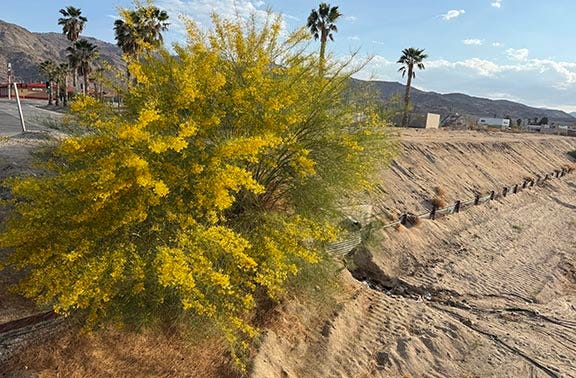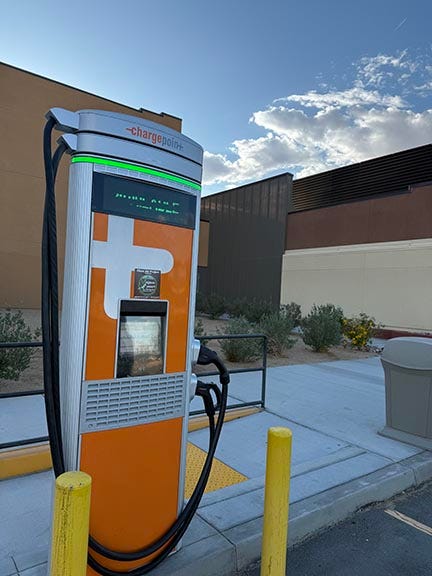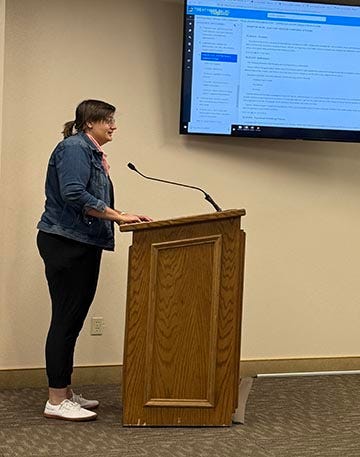RECAP: Planning Commission Meeting, May 6, 2025
Commissioners embrace the opportunities electrical vehicle charging stations will bring to the community but are mindful of the City's fragile power grid

City of Twentynine Palms Survey: Let your voice be heard ! Have you taken the City’s strategic planning survey yet? Here’s a link. Share your vision about makes Twentynine Palms special, and what you think the city should focus on in the coming years. The City has not provided a deadline, so do it now!
The Planning Commission meeting on Tuesday, May 6, took place with a full complement of commissioners and a very light agenda. The agenda is here, and our preview is linked here. The meeting consisted mostly of a study session on electrical vehicle (EV) charging and although the City typically has not livestreamed or archived study sessions, this one is available here.
No one stood up to make a comment in the main portion of the meeting. After passing the consent calendar—which consisted of the minutes for the April 15, 2025, meeting and a vote to accept the resolution that outlines the development code changes for ancillary activities—the commission dug into a study session.
State Law Requires Streamlining of EV Charging Stations
Community Development Director Keith Gardner explained that the City’s current development code doesn’t talk about EV charging stations at all. After the staff report that accompanies the agenda was drafted, staff discovered that a state law1 in 2015 allows the development of EV charging stations in any zoning district, subject to a building permit being issued. There is no additional land use approval required from the City’s Planning Division. This language does exist in the City’s municipal code but is not reflected in the development code.

Right now, there are no limits for how many EV charging ports can be put in one location in the City. There also aren’t any land use or zoning rules specific to EV chargers. Gardner said the City should change its development code to set expectations and avoid confusion later.
The commissioners had several concerns and questions. Commissioner Jim Krushat asked whether people needed a permit to install basic home chargers, known as level 1 chargers. Gardner said that level 1 chargers usually plug into normal wall outlets and don’t require permits. Commissioner Krushat agreed that permits should only be required for more powerful chargers, like level 2 or level 3, which use more electricity and are more complicated to install.
Pointing out that Southern California Edison’s planned outages have led to the cancellation of one Planning Committee meeting and continue to leave businesses in the dark, Commissioner Alex Garcia and others asked:
What does an abundance of these charging stations do to a power grid in a place that already has a pretty interesting power grid?
Commissioner Max Walker echoed this concern:
When the base was looking into...charging vehicles, you were going to need about an extra 10 megawatts of power. So…when people are wanting to come build a charging station somewhere, [we do] the engineering studies at least, to make sure the power is going to be [there when] they plug all these things in and everybody down the road is not losing their power.
Commissioner Leslie Paahana said she would prefer to see EV stations treated more like gas stations:
Requiring discretionary review through conditional use permits or other processes is something that we can't really do if it's competing with the streamlining laws. The only thing that we really could do is find anything that has a health and safety requirement.
Gardner agreed and pointed out that EV stations, like gas stations, would also have ancillary uses such as a convenience store or amenities for guests while their vehicles are charging.
Commissioner Walker expressed concerns about charging stations being built in residential areas. Chair Jessica Cure said,
Yeah, there's definitely some specific language that needs to be there. With the SCE upgrades, shutting down businesses during prime hours, really affect the local business….That’s obviously a concern for everyone.
Because this was a study session, no decisions needed to be made. The commissioners’ thoughtful discussion and awareness of the City’s fragile grid will help guide how the City’s Planning Department proceeds with its recommendations.
Public Comments on the EV Study Session

Caitlin Gill, a resident of Twentynine Palms and owner of Joshua Tree Astronomy Adventures, spoke in support of EV charging stations. She said that most EV stations are built by businesses, not individuals, and many of them use solar power to reduce stress on the power grid. Even though solar-powered stations still connect to the grid, they help lower the amount of electricity needed:
Our power grid on a national level is very fragile, and repairs for our power grid at that level are not feasible. It's a long-term problem for us nationally, so for us locally, insulating ourselves from the negative effects of this much broader problem is really important. So it takes smaller steps like this where more electric drain from something like an EV station could be mitigated by the utilization of other options to power that station.
EV charging stations could also attract tourists, who might spend money in local businesses. Gill pointed out that there are very few locations in the Morongo Basin for people with electric vehicles to charge up, and this is an opportunity for Twentynine Palms to be a leader.
Mark Jin also spoke. He did not identify his relationship to the City and does not appear to be a resident or local land owner. He explained that he is planning to build a solar-powered EV charging station. He said the land in the area is still affordable compared to other places, which makes it a good place for solar projects and EV stations. Jin supports making this kind of progress in Twentynine Palms.
Commission Chairperson Cure had an additional thought about requiring shade structures or cooling areas for charging stations. She said she’d recently hosted a family member who chose to drive to the Rivian charging station in Joshua Tree. “So I know this is something that is needed and wanted.”
Commissioner Garcia said he was in full support of charging stations,
I don’t want to see someone take advantage of a small community, and that's always my thought process….I do agree it is sustainable and it is a good thing for the community.
Chairperson Cure closed the meeting, saying that discussions on EV charging stations will continue at a future meeting once more information is available.
Presumably Assembly Bill AB 1236, which streamlines the permitting process for EV charging stations. A companion bill, AB 970 (2021), a companion to AB 1236, sets very short, mandatory timelines for a local jurisdiction to determine whether an application for an EV charging station per AB 1236 is complete and to approve or deny the application.
Desert Trumpet is looking for writers! Are you interested? Email your resume and two writing samples to editor@deserttrumpet.org and we’ll be in touch!
Leave your thoughts in the comments below. Please note that we do not allow anonymous comments. Please be sure your first and last name is on your profile prior to commenting. Anonymous comments will be deleted.
Feel free to share this article!
We have reached our goal of $5,000 in paid subscriptions! We are very grateful for support from our community. We know that many communities in the Morongo Basin are economically disadvantaged, so our coverage will always be free. However, if you have the means to support our work, we always appreciate upgrades to a paid subscription. Your upgrade helps keep subscriptions free for those who cannot afford to donate.
Note: Your subscription/donation will be listed as AHA Projects, the name of our fiscal receiver, on your statement.




Perhaps the City would consider giving some type of grant to any owners of properties inside the city that are vacant, that could be used as a site for a charging station. This may prompt owners to clean up their property and have it be useful to them as a business as well. Such properties as the one that used to be a gas station/used car lot on the corner of Adobe and Hwy 62, next to Rocky’s Pizza or the abandoned car wash that has recently been approached by the Code Enforcement concerning its trash, etc.
We have an electric car and have been stressed to find fast chargers in the Morongo Basin. The chargers at Freedom Plaza are slow and often broken. Two ideas to consider...
1. There's an odd unofficial line that car owners have to form to wait for chargers, which can be intimidating. EV station designers should clearly mark how the line should form to avoid conflicts.
2. With time on our hands waiting both in line and while charging, give us something to see, eat, do, buy, etc. Don't encourage charging stations in the middle of nowhere--they should be built near businesses.